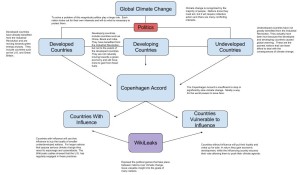The WikiLeaks cables showed how complex the politics of climate change are. I didn’t want to focus on the specific acts that any one nation was taking, but rather what was driving those actions. In my diagram I illustrated that climate change is finally recognized worldwide as a scientific fact by the majority of nations. Private citizens and politicians have begun to understand the dire implications of climate change not only for future generations, but for current ones as well. I think the world is beginning to act on climate change even if we’re in the early stages. My second bubble is “Politics” because now that the problem is recognized, the politics of nations comes into play. WikiLeaks gave us an interesting insight into the behind the scenes actions of our government and governments around the world. By looking at the actions of these governments and their economic situations, I placed them into either the “Developed,” “Developing,” or “Underdeveloped” categories. Developed nations like the U.S. have already benefited from the industrial revolution and are moving towards a green economy regardless whether we are forced to or not. Developing countries have benefited from the industrial revolution and use of fossil fuels, but not to the same extent as the developed countries. They still rely and will rely on fossil fuels for many years to come. The developed countries had their turn and ruined the environment in the process. To them it’s only fair that they be allowed to maximize their economic development through the use of fossil fuels. We also have the underdeveloped countries. These countries have not benefited greatly from the industrial revolution, but they often bear the worst of its consequences. I further categorized “Developed” and “Developing” in to “Countries with Influence.” The “Underdeveloped Countries” were placed into a category titled “Countries Vulnerable to Influence.” Essentially the developed and developing countries are using political, economic, and covert tools to exert their influence, while the underdeveloped countries are selling their votes. The Copenhagen Accord battle is just one battle of many more to come in the climate change saga.
The earth is at a point where change must happen, especially with the discovery of a planetary bound. Our planet is extremely resilient, but our actions have pushed this resiliency near its limit. I believe that everything should be done by the U.S. to slow climate change, with the eventual goal of stopping it. I do not think that the U.S. diplomatic cables should have been released. Transparency is great, but other nations opposed to our plans would use that information to undermine our efforts. I see this as a question between distributive justice and procedural justice. A country subscribing to procedural justice would follow all international rules and not worry about what decisions are made. The better approach is to follow distributive justice and concern ourselves with the consequences of our actions. We should weigh each decision and see if it will benefit the people of the world. The U.S. is in a unique position as the world’s super power to foster change or force change if need be. We should use our influence to create change diplomatically, while also creating change with our economic resources. If we can help other nations become more sustainable their economy, quality of life, and the global climate change situation will improve. In my opinion the ends justify the means when it comes to climate change. I do not have a problem with the methods used by the U.S. to pass the Copenhagen Accord, but I do have a problem with the consequences. The Copenhagen accord is a flimsy agreement that will do little to stop climate change. The agreements passing also weakened other more promising solutions. It appears that the U.S. was more interested in saving face than actually creating change. We need the world’s super powers to us any means necessary to solve climate change. It is a classic collective action problem and I think the solution is a strong country willing to lead. People will always look out for themselves before they worry about what the world’s climate will be like in 100 years.


Hi Christopher, I’m Eunice Lee majoring in Early Childhood Education. I enjoyed your blog entry because I thought your sentence of the earth being resilient and our actions pushing the resiliency near the limit was on point. I also thought it was interesting because our views are different for U.S diplomatic cables. I thought it should have been released but not like how it happened. Also, I thought your diagram was sophisticated to explain about the connection between the article and the climate change. However, I think you should have simplified your answers to make it more easy to read.
Thank you for sharing and this is my blog entry :http://geog030.dutton.psu.edu/2016/04/06/module-9-climate-change-3/
Hello Christopher,
I enjoyed your blog because I agree with the fact that we need to change our ways now. I like where you said the Earth’s resiliency is being pushed to the limit. I am very intrigued about how you said the Copenhagen Accord is basically fruitless when it comes to stopping climate change. I agree with the fact that this is a collective action problem. Your system diagram flows very well. Check out my blog at: https://wp.me/p3RCAy-dM4
Anthony
Hey Christopher, my name is Lizzy and I found your blog post very insightful and well-written. I like the way that you took a more political approach to your diagram, because it was definitely a relevant factor to most situations. Your diagram makes it easier to see the differences that underdeveloped and developed countries faced in this situation. Here is a link to my blog post describing some of my viewpoints on this situation: http://geog030.dutton.psu.edu/2016/04/06/52792/.